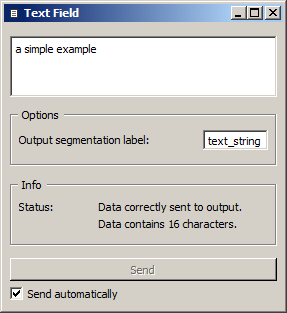Text Field¶

Import text data from keyboard input.
Signals¶
Inputs:
Text dataSegmentation containing text to be edited
Outputs:
Text dataSegmentation covering the input text
Description¶
This widget allows the user to import keyboard collected data. It emits a segmentation containing a single unannoted segment covering the whole string. Secondarily, Text Field can be used to manually edit a previously imported string.
The interface of the widget is divided in three zones (see figure 1 below). The upper part is a text field editable by the user. The standard editing functions (copy, paste, cancel, etc.) are accessible through a right-click on the field.

Figure 1: Interface of the Text field widget.
The Options section allows the user to define the label of the output segmentation (Output segmentation label), here text_string.
The Info section indicates the length of the output segmentation in characters, or the reasons why no segmentation is emitted (in particular if no text has been entered in the field). In the example, the single segment contained in the output segmentation covers 16 characters.
The Send button triggers the emission of a segmentation to the output connection(s). When it is selected, the Send automatically checkbox disables the button and the widget attempts to automatically emit a segmentation at every modification of its interface (editing of the text or label modification).
It should be noted that the text field’s content is normalized in three ways:
- it is systematically converted to Unicode
- it is subjected to the canonical Unicode decomposition-recomposition technique (Unicode sequences such as
LATIN SMALL LETTER C (U+0063)+COMBINING CEDILLA (U+0327)are systematically replaced by the combined equivalent, e.g.LATIN SMALL LETTER C WITH CEDILLA (U+00C7)) - various forms of line endings (in particular
\r\nand\r) are converted to a single form (namely\n)
When an instance of Text Field receives a segmentation on an incoming connection, the contents of all incoming segments are concatenated (without adding any delimiters) and the resulting string replaces the current textual content of the widget (if any). This allows the user to manually edit text that has been previously imported in Orange Textable. Some points are worth noting:
- This operation creates a distinct string from the one that has been previously imported: it really amounts to copying the original string and making the copy available for manual edition. As such, it is prone to a very specific and possibly disconcerting type of error, which can be best understood by studying the example given in the documentation of Preprocess (section Caveat), where what is said about Preprocess also applies to Text Field.
- Modifications brought from within the interface of Text Field to a string imported in this way will be lost if the Text Field instance receives a new input on its incoming connection. In particular, this will happen if the schema is saved and later re-opened. To avoid any loss of data, the safest way to operate is to remove the incoming connection as soon as it has been created and the string has been copied in the Text Field instance’s interface; indeed, removing the incoming connection will not remove the imported string from the instance’s interface, where it can then be edited without risking to overwrite it.
Messages¶
Information¶
- Data correctly sent to output: 1 segment (<n> characters).
- This confirms that the widget has operated properly.
- No data sent to output yet: text field is empty.
- The widget instance is not able to emit data to output because no text has been entered in the text field.
- No data sent to output yet, see ‘Widget state’ below.
- A problem with the instance’s parameters and/or input data prevents it from operating properly, and additional diagnostic information can be found in the Widget state box at the bottom of the instance’s interface (see Warnings below).
Warnings¶
- No label was provided.
- A label must be entered in the Output segmentation label field in order for computation and data emission to proceed.